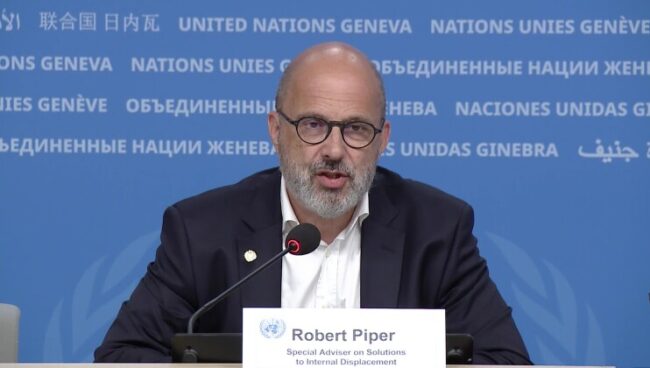The United Nations Special Advisor on Solutions to Internal Displacement, Robert Piper, has said that the private sector plays a vital role in job creation, entrepreneurship support, and driving economic growth for the successful inclusion of Internally Displaced Persons (IDPs) in Africa.
While speaking at the African Roundtable on Private Sector Solutions to IDPs in Africa recently in Lagos, Robert highlighted that they have developed a new generation of solution plans to move millions of internally displaced persons onto pathways for sustainable solutions.
He emphasised the need for capital, ideas, creativity, and markets for the successful inclusion of IDPs in Africa.
“We have a new generation of solutions plans that promise to move millions of internally displaced persons onto solutions pathways. The private sector has a vital role to play—by creating jobs, supporting entrepreneurship, and driving economic growth. We need capital, we need ideas, we need creativity, and we need markets. Success depends on it,” Robert stated.
Also speaking, the UNHCR Assistant High Commissioner for Operations, Raouf Mazou, noted that the goal is the achievement of self-reliance and socio-economic inclusion of IDPs. He underscored the private sector’s key role in creating jobs and enhancing access to services. He added that the roundtable was crucial in fostering discussions on overcoming barriers and finding mutual benefits for sustainable solutions to displacement.
“Achieving self-reliance and socio-economic inclusion of these populations should be the goal. The private sector plays a key role in creating jobs and enhancing access to services, and this Roundtable was crucial in fostering discussions on overcoming barriers and finding mutual benefits for sustainable solutions to displacement,” he said.
In his remarks, the Vice Chairman of Tropical Investments Group (TGI), Farouk Gumel, noted the timeliness of the private sector’s recognition of the immense potential in addressing internal displacement.
Gumel suggested the creation of sustainable solutions for both IDPs and host communities. He emphasised the importance of establishing a favourable regulatory environment, implementing de-risking strategies, and fostering public-private partnerships.
“It is time for the private sector to recognise the immense potential and responsibility in addressing internal displacement, let alone at our doorstep. By leveraging our resources and expertise, we can create sustainable solutions that not only support displaced and host communities but also drive economic growth and innovation for all.”
“To effectively operate in internal displacement contexts, it is crucial to establish a favourable regulatory environment, implement de-risking strategies, and foster public-private partnerships. By addressing these key areas, we can ensure that the private sector is empowered to contribute meaningfully and sustainably to the well-being of displaced populations and their hosts.”
The roundtable brought together over 250 participants from 11 countries and focused on nations with the highest populations of IDPs, including Burkina Faso, the Central African Republic, and Chad. Other countries discussed included Niger, Ethiopia, Mozambique, Nigeria, Somalia, Sudan, and South Sudan, all grappling with significant displacement challenges.
READ MORE FROM: NIGERIAN TRIBUNE
Get real-time news updates from Tribune Online! Follow us on WhatsApp for breaking news, exclusive stories and interviews, and much more.
Join our WhatsApp Channel now
